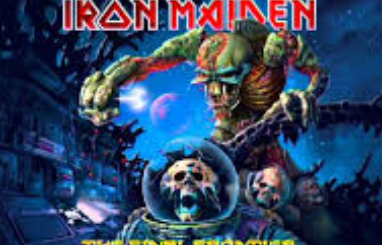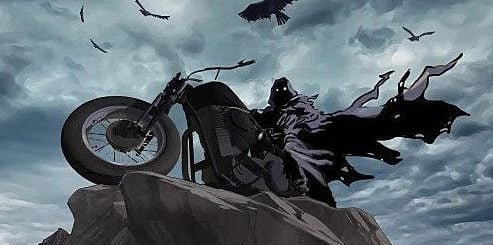Back in the Village by Iron Maiden Lyrics Meaning – Unraveling the Enigmatic Tapestry of Warfare and Identity
Lyrics
Switch the dial and eat the worm
Take your chances, kill the engine
Drop your bombs and let it burn
White flags shot to ribbons
The truce in black and ubrned
Shellshock in the kitchen
Tables overturned
Back in the village again
In the village
I’m back in the village again
Throwing dice now, rolling loaded
I see sixes all the way
In a black hole and I’m spinning
As my wings get shot away
Questions are a burden
And answers’ a prison for oneself
Shellshock in the kitchen
Tables start to burn
Back in the village again
In the village
I’m back in the village again
No breaks on the inside
Paper cats and burning barns
There’s a fox among the chickens
And a killer in the hounds
Questions are a burden
And answers’ a prison for oneself
Shellshock in the kitchen
Tables start to burn
Back in the village again
In the village
I’m back in the village again
But still we walk into the valley
And others try to kill the inner flame
We’re burning brighter than before
I don’t have a number, I’m a name
Back in the village again
In the village
I’m back in the village again, yeah
Back in the village again
In the village
I’m back in the village again
Back in the village
And I’m back in the village
And I’m back in the village again
Iron Maiden’s ‘Back in the Village,’ a track from their 1984 album ‘Powerslave,’ is a sonic enigma—a multilayered narrative woven with imagery alluding both to the personal and the political. The band, known for their rich storytelling and compelling musicianship, has created a song that continues to provoke analysis and debate among fans and critics alike.
In the charged atmosphere of the Cold War era, the song’s evocative lyrics seem to merge the microcosm of individual struggle with the macrocosm of global conflict. But what lies beneath the surface of this high-voltage anthem? Here, we plunge into the hidden depths of ‘Back in the Village,’ dissecting its thematic cores and cryptic metaphors.
Striking Chords in a Cold War Symphony
Released during a time of heightened political tensions, ‘Back in the Village’ resonates with the anxiety and edginess of the Cold War era. The song’s visceral imagery of ‘white flags shot to ribbons’ and ‘truce in black and unburned’ evoke the fragility of peace in a world poised on the brink of annihilation. Iron Maiden crafts a vivid audiovisual battleground where the personal costs of war become palpable to the listener.
The relentless intensity of the music captures the sense of urgency and chaos intrinsic to the threats of that time. Iron Maiden uses their powerful dual guitars and galloping bass lines to mimic the sounds of conflict, transforming their instruments into aural proxies for the artillery and mayhem evoked in the lyrics.
A Dice Game with Fate: Exploring Personal Struggle
Yet, ‘Back in the Village’ does not merely paint a backdrop of external hostilities; it also serves as an allegory for the internal combat each person faces. The lyrics ‘Throwing dice now, rolling loaded / I see sixes all the way’ speak of predetermination and control, hinting at the gamble of life’s choices amid the constraints of societal or systemic forces.
The ‘black hole’ and ‘spinning’ metaphors could be a nod to the vertigo-inducing nature of personal crises, as if battling one’s own spiraling fate is akin to dogfighting in a war-torn sky. By weaving the battle within and the war without, Iron Maiden taps into a universal narrative of resistance and resilience.
Unearthing the Song’s Hidden Meaning: The Village as a Metaphor
What is this ‘village,’ and why does its refrain strike with such foreboding? On one level, the village might represent familiarity, a cyclical return to origins, or the inescapability of one’s roots. Yet Iron Maiden’s iteration is laced with irony. Being ‘back in the village again’ suggests a Sisyphean loop of conflict, where no resolution is found, only the repetitive motions of war and strife.
In this light, the village could also symbolize the entrapment within a militaristic society, where individuals are doomed to play out their roles in the grand theatre of war. ‘Paper cats and burning barns’ evoke images of decoys and destruction—perhaps a smokescreen for the true predatory nature of national aggression.
The Prison of Answers and the Redemption of Identity
The song provokes reflection on the constraints of conventional wisdom, with lines such as ‘Questions are a burden / And answers’ a prison for oneself.’ These lyrics suggest a critique of dogma and the stifling effect of rigid ideologies. One might read it as an encouragement to seek liberation from the accepted narratives that bind and label us.
‘I don’t have a number, I’m a name,’ serves as a powerful declaration of individual identity in the face of dehumanization. It’s a battle cry for personal autonomy and an assertion of self in an environment that seeks to homogenize and control.
Quotable and Quixotic: Memorable Lines That Linger
Iron Maiden’s ability to craft phrases that echo through the corridors of their listeners’ minds is on full display in ‘Back in the Village.’ ‘Shellshock in the kitchen / Tables overturned’ speaks to the sudden destabilizations life can serve up, recontextualized within the domestic sphere where they sting with a particular poignancy.
The metaphorical language challenges listeners to decipher the broader implications of the song’s vignettes. By allowing the lines to be laced with multiple interpretations, Iron Maiden invites a discourse that transcends the temporal confines of the track, ensuring that its messages, no matter how one interprets them, will continue to resonate with fans across generations.








